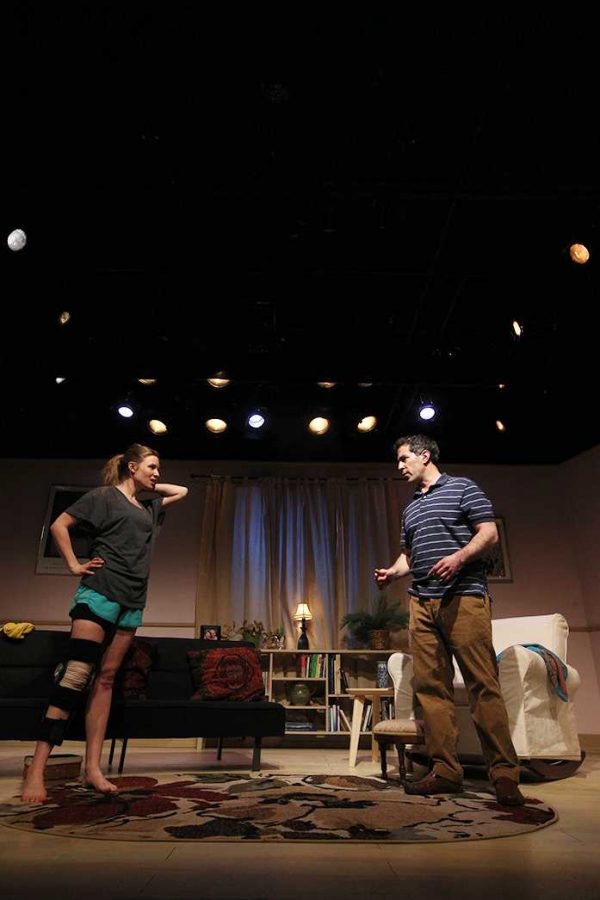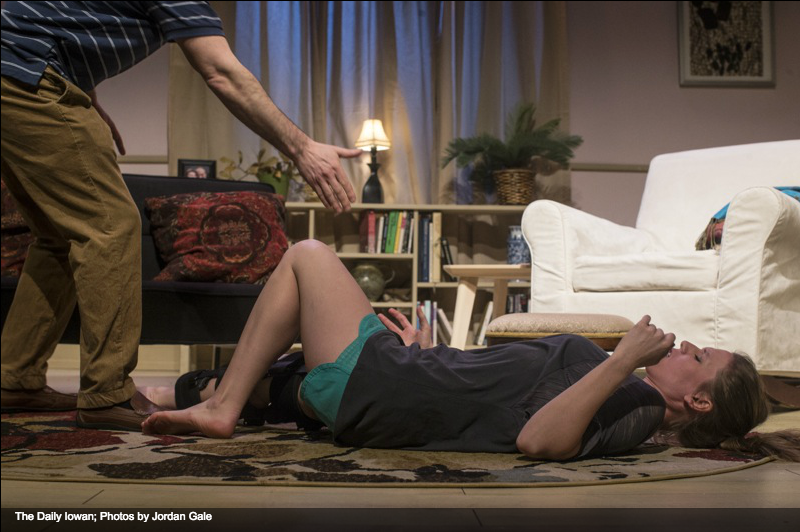An autistic professor and an injured dancer will meet on Riverside Theater’s stage during the next two-plus weeks in Dancing Lessons.
By Justus Flair | [email protected]
Red, gold, and hints of green on the muted floral rug interrupt the smooth, bleached hardwood floors. Blush-tone walls, broken by a single central window, welcome visitors to Senga’s home.
“This is starting to look like an apartment I’d want to live in,” joked director Angie Toomsen during a rehearsal for Riverside Theater’s Dancing Lessons, which will open Friday and run through April 17.
The illusion wasn’t complete quite yet, the window still a literal hole in the wall, showing off the theater’s scene shop and storage space behind the stage. Stage left, a bright black and orange wall runs perpendicular to the apartment, a remnant from another production yet to be hidden.
“It’s an apartment of someone who used to be lively and vivacious but is now injured and doesn’t want anything to do with the outside world,” said scene designer Courtney Schmitz. “We want to convey a sort of self-made isolation – almost a hermit-like atmosphere.”
That separation means a cityscape will never shine dimly through that window. Instead, it will be covered completely, shutting out the world like a deadbolt on a door.
As the lights rise, they reveal Senga, lying flat on her futon, a chunky black brace swallowing her right leg from ankle to hip.
“I think it’s really scary to be an artist,” said Heather Chrisler, the actor playing the professional dancer. “In Senga’s case, one day she was walking down the street, a cab jumps the curb, and her life is over. Senga’s injury is my worst nightmare; it’s pretty close to the breast.”
When she and the audience meet Ever Montgomery moments later, they have an advantage over Senga; they know, though she does not, that Ever is autistic — more specifically, he has Asperger’s syndrome.
Ever, a stranger who lives two floors above Senga, strides into her apartment, demanding, blunt, and forward in his speech, constantly bordering on offensive. In one tongue-in-cheek line, he tells the dancer “theater’s like sports for people with no athletic ability.” She throws snappy one-liners at his questions and unwanted opinions. Her words are funny, albeit a bit too bitter and biting.
“I think Senga does actually belittle him in the beginning before she understands him,” Toomsen said. “And part of that is merely the defensiveness of where she is; she’s struggling with a tragedy of her own and an uncertain future.”
Senga is angry and depressed; her treatment of Ever is more about her than him.
“Senga needs to make the audience uncomfortable at the beginning,” said Sam Osheroff, Riverside’s artistic director, playing Ever in the production. “If she didn’t do that, she wouldn’t have a journey to make later.”
It’s an uphill trek over rocky terrain. Without the mockery of the beginning, her sincere pledge, “I wasn’t making fun of you,” in a later scene wouldn’t pack nearly the same powerful punch. Still, there’s much progress to make.
“She has learned over time to stay away from people,” Chrisler said. “She’s been allowing her art and her ambition to feed her entire life, emotionally. She’s never wanted to face some of the unflattering truths about herself.”
Ever forces her to do so with his jarring personal questions, asked with such open, honest curiosity she cannot deny him an answer.
Click here to check out a photo slideshow.
“When you boil it down, this show is about two people from very different walks of life learning to understand each other,” Chrisler said. “That’s what’s so gorgeous about the romantic aspect of the play is that they don’t even want each other in their lives, and they end up, in a very short amount of time, becoming deeply engrossed in each other.”
To start comprehending each other, the two do what nearly everyone would: use the internet. Ever finds a video of Senga dancing on YouTube; Senga listens to an autistic man explaining the way his brain functions.
Osheroff took the same first step in researching how to bring Ever to the stage. Then he dug deeper.
“I contacted a number of people here in Iowa in the autism community,” he said. “I spent a lot of time asking questions and observing. I have relied on a lot of outside guidance.
“At the beginning, it was just so crude and over the top as I was trying to find things. I still need to keep looking for the subtleties in it.”
Small things like the curl of his fingers, the cadence of his voice, and his line of sight become critical components of character. Ever doesn’t touch people, rarely makes eye contact, and struggles with expressing emotions organically.
It creates a constant buzz of tension palpable in the theater, like a tightening throat, riding the edge of cracking but never giving in. Here is a woman, at the emotional climax of her life — career likely gone, relationship ended, life on the line – and her sounding board is a seemingly emotionless, at times robotic-sounding man hurling personal questions without pause.
It appears he doesn’t care, doesn’t feel for her as he recites statistics about her recovery chances, but he does. His emotions are expressed so differently than Senga’s own. They’re unseen, save rare moments when they emerge with calm lines like, “Usually when people compliment me, they’re being sarcastic,” revealing a self-awareness easily ignored in quieter moments.
Senga’s feelings, in contrast, are more obvious — eyes filling with tears, throat screeching out harsh words as hands jab in all directions. When Senga’s upset, she yells at others; when Ever’s upset, he yells at himself.
“Stories about mental health broaden our understanding of other people,” Toomsen said. “As Ever says, it’s not necessarily an illness, it’s just people whose minds work differently. In some ways, people on the spectrum see the world in ways ‘neurotypicals’ never have the opportunity to.”
Dancing Lessons isn’t an “issue play,” Osheroff said. It won’t offer solutions to the questions surrounding autism.
“The way a spectrum disorder like this expresses itself in an individual is entirely unique,” Toomsen said. “We weren’t trying to represent autism as a whole; we were trying to show how one particular person’s mind works and how he makes his way in the world.”
THEATER
Dancing Lessons
When: 7:30 p.m. Friday-Saturday, 3 p.m. Sunday
Where: Riverside Theater, 213 N. Gilbert
Admission: $12-$30




